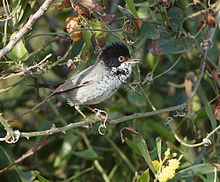| Cyprus warbler | |
|---|---|

| |
| Adult male | |
| Scientific classification | |
| Domain: | Eukaryota |
| Kingdom: | Animalia |
| Phylum: | Chordata |
| Class: | Aves |
| Order: | Passeriformes |
| Family: | Sylviidae |
| Genus: | Curruca |
| Species: | C. melanothorax
|
| Binomial name | |
| Curruca melanothorax (Tristram, 1872)
| |
| Synonyms | |
|
Sylvia melanothorax | |
The Cyprus warbler (Curruca melanothorax) is a typical warbler which breeds only on Cyprus.[2] This small passerine bird is a short-distance migrant, and winters in Israel, Jordan and Egypt.
Like most Curruca species, it has distinct male and female plumages. The adult male is a small typical warbler with a grey back, black head, white malar streaks ("moustaches"), and, uniquely among typical warblers, underparts heavily streaked with black. The female is mainly grey above, with a greyer head, and whitish with only light spotting. The Cyprus warbler's song is fast and rattling, and is similar to that of the Sardinian warbler.
Together with Rüppell's warbler it forms a superspecies with dark throats, white malar streaks and light remigial fringes. This in turn is related to the species of Mediterranean and Middle East Curruca warblers that have a naked eye-ring, namely the eastern subalpine warbler, Sardinian warbler and Menetries's warbler. Both groups have a white malar area, but this may not form a clear streak in the latter group; above the white, the heads of males are uniformly dark.(The Sylvia Monograph, A & C Black, London; Jønsson & Fjeldså 2006)
This is a bird of dry open country, often on hill slopes, with bushes for nesting. The nest is built in low shrub or gorse, and 3–5 eggs are laid. Like most "warblers", it is insectivorous, but will also take berries.
- ^ BirdLife International (2016) [errata version of 2017 assessment]. "Curruca melanothorax". IUCN Red List of Threatened Species. 2017: e.T22716963A111242444. doi:10.2305/IUCN.UK.2017-1.RLTS.T22716963A111242444.en. Retrieved 20 October 2022.
- ^ "RSPB Mass killing continues on British military base in Cyprus". BirdGuides. Archived from the original on 20 November 2016. Retrieved 16 March 2016.
